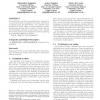Free Online Productivity Tools
i2Speak
i2Symbol
i2OCR
iTex2Img
iWeb2Print
iWeb2Shot
i2Type
iPdf2Split
iPdf2Merge
i2Bopomofo
i2Arabic
i2Style
i2Image
i2PDF
iLatex2Rtf
Sci2ools
106
click to vote
GECCO
2007
Springer
2007
Springer
Evolving controllers for simulated car racing using object oriented genetic programming
Several different controller representations are compared on a non-trivial problem in simulated car racing, with respect to learning speed and final fitness. The controller representations are based either on neural networks or genetic programming, and also differ in regards to whether they allow for stateful controllers or just reactive ones. Evolved GP trees are analysed, and attempts are made at explaining the performance differences observed. TRACK: GENETIC PROGRAMMING Categories and Subject Descriptors I.2 [ARTIFICIAL INTELLIGENCE]: Automatic Programming Keywords Evolutionary robotics, neural networks, Object-Oriented genetic programming, Subtree macro-mutation, Homologous uniform crossover
| Added | 07 Jun 2010 |
| Updated | 07 Jun 2010 |
| Type | Conference |
| Year | 2007 |
| Where | GECCO |
| Authors | Alexandros Agapitos, Julian Togelius, Simon M. Lucas |
Comments (0)

